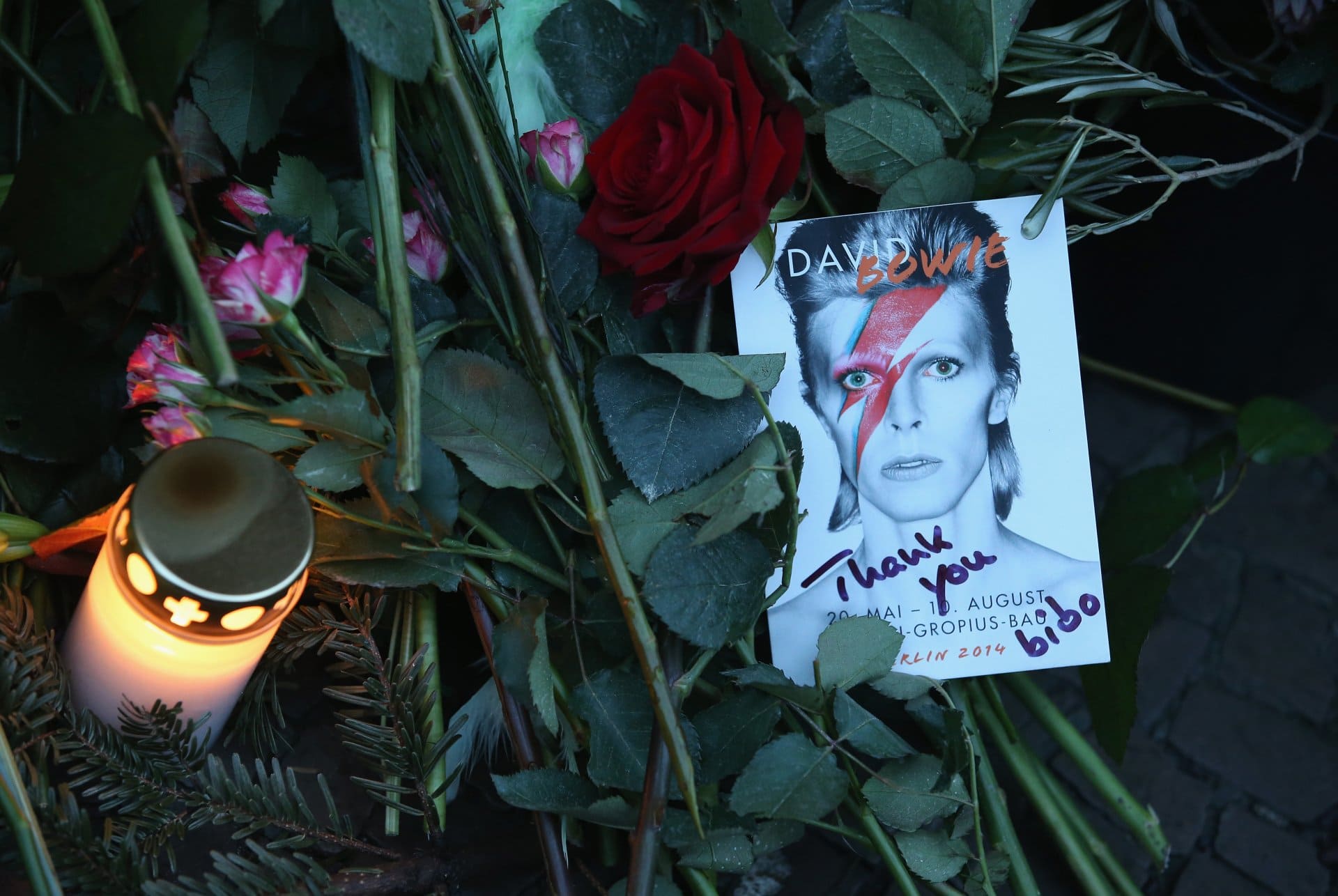
This month marks six years since the death of David Bowie. Most musicians would see death as a barrier to a continuing career. Not Bowie. Since his death in 2016 there has been almost as much “new” material released as there was during his lifetime. The most remarkable thing? All the evidence we have suggests that it was planned.

The world ended when David Bowie died. Think about it. The 10th of January 2016 was before Brexit, before Covid and before Trump. If music is the sap that connects our lives, maybe David Bowie’s music was holding the whole world together.
Bowie’s death was like the death of a friend. No, the death of a Father. I felt the need to work my way through it – and I had the perfect 21st Century vehicle to do so; a two hour round-trip to work, every day, and an iPhone. I slotted in my earbuds and spent most of 2016 listening and re-listening to nothing but Bowie. In those days there was a fixed canon of Bowie recordings. The official released studio, soundtrack and live albums that Bowie oversaw and released in his lifetime.
The world ended when David Bowie died – think about it…
I began with “David Bowie” – the twee and sentimental 1967 long player that debuted David Jones’ first use of “Bowie” as a pseudonym. The project ended with “The Next Day”, Bowie’s surprise album of 2013 and his best since 1980’s “Scary Monsters (and Super Creeps)”. I still haven’t re-listened to “Blackstar”. It’s just too painful.
The era from 1969 to 1983, from “Space Oddity” to “Let’s Dance”, is golden. This was music I had tattooed on the skin of my mind. After that, I lost touch with Bowie and moved on to his progeny (The Banshees, Bauhaus, Gary Numan). And Bowie? He lost touch with himself too, for a while.
Array1983’s “Let’s Dance” was followed by a series of diminishing attempts to string out its outstanding commercial success. The 1984 album “Tonight” was well-received at the time, but is tellingly stuffed with off-cuts. Five were co-written with Iggy Pop, three for previous projects.
Bowie – indisputably one of popular music’s most recognisable icons – saw out the decade pretending to be part of a band called Tin Machine. It was a move that is difficult to justify even through the rosiest of lenses and its aftermath tainted his solo work for years.
Bowie saw out the decade pretending to be part of a band called Tin Machine
There’s a common assumption among some musos that Bowie never recovered from Tin Machine, but a chronological listening project proved that wasn’t true. 1995’s “Outside” was a clattering return to form but, by then, not many people were looking. I was one of them and missed out on a sustained period through the latter half of the 90s and into the 2000s that was every bit as inventive and reinventive as anything he did in the 70s.
And then, the final work. Bowie had what was later described as a “mild heart attack” on stage during 2004’s Reality tour. Over the next few years he seemed to be winding down. There were no more tours or albums (other than archive releases). He played some guest spots and appeared in cameo roles – but otherwise, his career was in mothballs.

The Next Day
So, when “The Next Day” was announced in January 2013, it was a genuine shock. In retrospect, the activity of those last few years, from the secret recording sessions of 2012 to “Blackstar” in January 2016, seem like a sprint to the finish line. He even had time to write songs for, and collaborate on, a Broadway musical: Lazarus.
At the end of the project, my grief was still there – but I found I had a new appreciation for the shape of Bowie’s life. When you listen to the collected canon, you are privy to the emotional and intellectual becoming of a genius.
You are, for a brief time, transported from a plane of existence with no colour to a psychedelic realm of rhizomatic possibilities
You are, for a brief time, transported from a plane of existence with no colour or substance to a psychedelic realm of rhizomatic, branching possibilities. It was an expertly curated and complete life, reduced to a narrative. A perfect ending.
But, as quixotic and charismatic in death as he was in life, Bowie had other plans. He was producing demos for another album at the time of his death, but also had plans to re-record Reality – the last studio album before “The Next Day”. Most tellingly, he was preparing a series of career-spanning box sets that collated his work by era.

From beyond
It’s difficult to know just how involved Bowie was in the series, because most of the work has been released posthumously – but we do know the plan was already in place while he was still alive. The box sets (plural) were announced in June 2015, while Bowie was halfway through the recording of “Blackstar”, and the first (Five Years (1969-1973) was released in September of 2015. In an article from February 2016, Newsweek quoted a source “close to Bowie” that there was a “long list of unscheduled music releases that Bowie planned before he died”.
And, indeed, Five Years sets a template that suggests that even if Bowie wasn’t there for the finer detail, he signed off on the broad strokes. The box sets repackage all of Bowie’s official studio output. Alongside this is a plethora of archive material; demos and alternate takes that – like Dylan’s Bootleg Series and The Beatles Anthology – are pleasing for those completists who seek to unravel the magic and mystery.
And here we are, nearly six years later, and five of those box sets have now dropped
But they then go a step further, with alternate or original album mixes – akin, again, to the treatment of The Beatles’ later output (which has seen new mixes of Sgt. Pepper, The Beatles (“White Album”) and, most recently, “Let It Be”. In Bowie’s case, we’ve had mixes of Ziggy Stardust and the Spiders from Mars, Station to Station, Lodger and others. Entire, alternate albums.
And here we are, nearly six years later. Five of those box sets have now dropped, each containing 11 or 12 CDs worth of original works alongside archive mixes, rarities and, in several notable cases, previously unreleased albums.

Loving the Alien
The first of these was The Gouster in the “Who Can I Be Now? (1974-1976)” set. It’s an organic funk workout that originally came on the heels of the apocalyptic glam rock epic “Diamond Dogs”; a test run for Young Americans and (later) the Chic augmented pop of “Let’s Dance”.
There’s a re-recorded version of an entire album in the “Loving the Alien” (1983-1988) set. Never Let Me Down was poorly received on release, arriving in the middle of Bowie’s wilderness years and was described by one critic as “slapdash”. It clearly irked Bowie because the project to re-record the album dates back as far as 2008, when the track Time Will Crawl was remixed. The template was used in 2018 to recreate the album with Bowie’s original vocal tracks. Long-time collaborator Reeves Gabrels claims Bowie handpicked the band in notes made before his death.
Long-time collaborator Reeves Gabrels claims Bowie handpicked the band in notes made before his death
There have been other works, EPs and unreleased tracks. But, perhaps most exciting of all is the official release of the LP “Toy in the Brilliant Adventure” (1992-2001) boxset. While The Gouster is clearly a dry run for Young Americans, “Toy” is an entire unreleased album, legendary among Bowie acolytes, and already an oddity at the time of its recording.
Held up by label politics, many of its tracks have been heard – but not in the original sequence or versions. It was parcelled out in dribs and drabs across “Heathen” (the album that came out in its place) and B-sides. Several were already re-recordings of Bowie’s 1960s output. The most bootlegged album of Bowie’s career, it will finally have its own official, standalone release on 7th January 2022 (with a second CD of alternate versions and mixes).
David Live
Bowie fans will know that he was also responsible for some of the finest live albums in rock history too. The Spiders From Mars were an exceptional rock band, but after retiring Ziggy Bowie consistently worked with some of the finest musicians in the world and shaped them into collaborators. Couple that with the eclecticism of his output and a Bowie concert was always an exercise in interpretation rather than reproduction.
Every live album has versions of songs that stand apart from their studio origins – and occasionally transcend them. His live versions of Life on Mars accompanied on solo piano by Mike Garson. The encore of Rock and Roll Suicide from the final Ziggy concert at the Hammersmith Odeon in 1973. Every live version of Brel’s “My Death”.
There were seven official live albums released during Bowie’s lifetime. Now there are ten more, including the legendary Glastonbury gig filmed by the BBC and Bowie at his commercial zenith during the Serious Moonlight tour.
2022 looks like it will be another rough year for us all – we might as well spend it with David
It would be easy to be cynical about all of this. Michael Jackson’s estate earns tens of millions every year, topping Forbes’ annual list of highest-earning dead celebrities from 2013-2020. Elvis Presley’s backing band was still touring before COVID, playing along to isolated vocal tracks and video of the King in his prime. But Bowie seems to have planned this – his afterlife – either by accident or design.
If I were to embark on the same listening project now – a chronological review of Bowie’s officially released work – it would take roughly twice as long. If only all tasks in our lives were this illuminating; this transformative.
2022 looks like it will be another rough year for us all. We might as well spend it with David.





1 Comment
Love Bowie. Met him at a sound check, Glass Spider Tour @LA Forum back in the 80’s, I think. At the time I was dating the Operations Manager @KROQ 106.7-he took me to lunch one afternoon & I never went back to work lol